We are developing the social individualist meta-context for the future. From the very serious to the extremely frivolous... lets see what is on the mind of the Samizdata people.
Samizdata, derived from Samizdat /n. - a system of clandestine publication of banned literature in the USSR [Russ.,= self-publishing house]
|
British troops injured in war are being forced to pay for private medical treatment or join the long patient lists waiting for operations on the National Health Service. A staffing crisis in the Defence Medical Services (DMS) means that more than 10,000 soldiers – the equivalent of 15 infantry battalions – are currently not fit for frontline duty.
Large sections of the Army will be declared un-operational because of the number of troops waiting for surgery unless there is an emergency injection of cash. Commanding officers have been rationing the private treatment but the amount of money available to each unit for private healthcare is not enough to reduce the number of servicemen and women waiting for operations.
The Telegraph reports:
One soldier, who was injured on active duty in Afghanistan, has now been told that he faces a 12-month wait for a knee operation unless he is prepared to pay £2,000 for private treatment.
Another soldier who recently returned from Afghanistan after serving with the International Stabilisation and Assistance Force (Isaf) has been told that he will have to wait six months before he can see a specialist about his damaged ankle. He may then face a further year’s wait for an operation. He has, however, been advised that if he were to go private, he could see a specialist immediately and have the operation within three weeks.
In addition to the pain and inconvenience caused by the injuries, service personnel are “medically downgraded”, if the injury prevents them from carrying out their duties. They are unlikely to be able to undertake courses which are physically demanding and cannot be deployed on military operations. Their pay can decrease and they may be passed over for promotion until fully fit.
This is just one example of how Blair’s government is treating the armed forces. The undermining of the British military is a result of a profound distrust of it by the New Labour establishment, despite the fact that the armed forces are the only state entity that has consistently bailed the government out of its botched policies (foot and mouth crisis) and allowed Tony to play a world statesman (Afghanistan, Iraq).
Blair achieved a measure of uncritical popularity with the American public, due to his support of Bush’s determination to depose Saddam. He risked his job and support of his voters at home in order to do that. It may be commendable and we wholeheartedly supported his efforts that resulted in the liberation of Iraq. We did so without any delusions as to his statist convictions, in which near messianic zeal mixes with autocratic tendencies.
However, those on the other side of the Atlantic harbouring inflated opinions about Blair, and occassionally making preposterous comparisons of Blair to Winston Churchill or other great British statesmen, should examine the way their pet foreign leader behaves on the domestic scene. Let the Telegraph article be an eye opener to the true nature of the valiant Prime Minister Blair and his tightly led pack of ministers.
We at Samizdata.net do not trust the man further than we can throw him. So watch this space, we will be reporting on the latest development in Blair’s successful dismantling of other worthwhile British institutions.
 
Churchill Not Churchill
The Ministry of Defence is leaving no stone unturned in its investigations of the allegations against Colonel Tim Collins:
The Ministry of Defence said an inquiry into the death raised issues about the “wider military culture” within the unit which demanded further investigation.
Say it isn’t so!! A ‘military culture’ in the British Army? Has the world gone stark raving mad? ‘Military culture’ has no place in our armed forces and it must be rooted out forthwith.
To all intents and purposes, the war has been over for a few days now, bar the shouting. Oh sure, incidents like the sabotage of the arms dump earlier today are going to be a problem for quite some time to come, so it is not exactly ‘Miller Time’ just yet, and I fully expect a few ‘messy days’ ahead. The war, however, is over and the police action is beginning.
What I am interested in is, from a purely military point of view, what went right and what went wrong? Which weapons performed as advertised and which did not? Which systems and organisations did better than expected and which did worse? Was ‘shock and awe’ a Terrible Swift Sword or a damp squib… or bit of artful misdirection? Can we start trying to pick through the propaganda and extract the signal from the noise, or is it still too soon?
In short… it is time for those who are interested in such things to start trying to figure out what the text books are going to say about this war in 5 years time. For example, there is some interesting stuff on Intel Dump, such as some discussion of the 11th Aviation Regiment’s repulse near Baghdad. As significant military set backs like that were so rare, the ones that happened will no doubts be analyzed to the point of obsession. Similarly there have been some spectacular images of just how tough the A-10 Warthog proved to be even after a severe pounding.
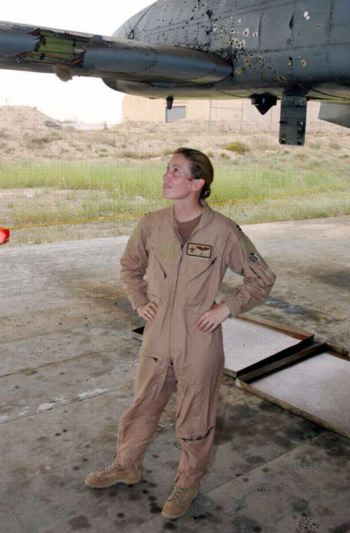
Hard as nails… the aircraft is pretty tough too
So… who has some good links to reports to contribute? Leave a comment!
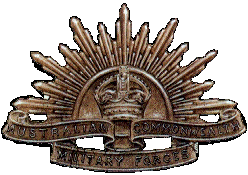
Once again Australians are celebrating ANZAC Day. It seems only yesterday I was writing about it here on this blog but another year goes by and yet again, British and Australian soldiers are on Middle Eastern soil together.
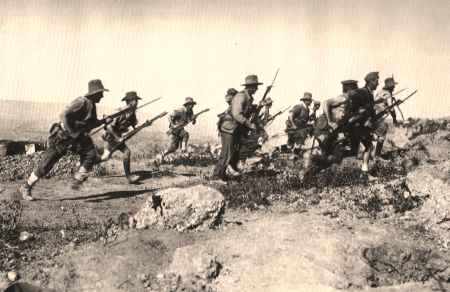
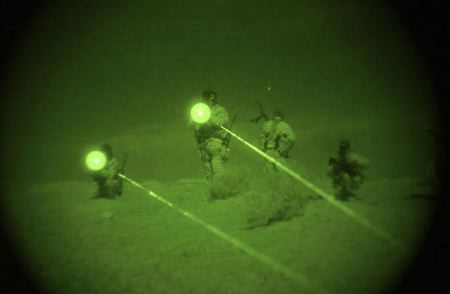
There will be no ticker-tape parades for the returning heroes of Gulf War II and, given the current political and cultural climate, I suppose that is understandable. However, one would have thought that Mr.Blair might at least see the benefit of a suitably discreet pause before publicly shafting them:
Tony Blair is prepared to radically scale down the Royal Irish Regiment as part of his proposals to persuade the IRA to destroy all its weapons and halt all paramilitary operations, army and political sources claimed yesterday.
So it appears as if the Royal Irish Regiment, whose members fought with such gallantry and tenacity in the Battle for Basra as far back as…ooh, let’s see…a few days ago, are to be issued with a whole new set of marching orders. Thanks very much, chaps, now fuck off!
The irony can surely only be desribed as breath-taking. Whilst neither Saddam’s Ba’athist thugs nor his Republican Guards could put so much as a dent in them, their very existance as a fighting unit is about to be sacrificed by a government that will stop at nothing in a (vain) attempt to appease the brooding war-dogs of Sinn Fein/IRA.
In British military vernacular they are called ‘bumpy jumpers’, but they are a sight more chilling to the very hearts of Islamic fundamentalist extremists than an approaching squadron of B-52s wheeling in for an attack run.
Women without veils…
Good looking blonde women without veils…
Good looking blonde women without veils with guns!
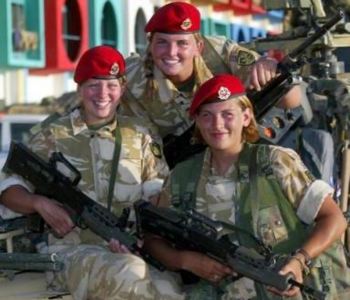
The news that Kirkuk, centre of the northern Iraqi oil industry, has fallen not to the coalition, but to US backed Kurdish Peshmerga has electrified the Kurds and horrified the Turks. I suspect that the Jash (pro-Saddam Kurds) are going to be cut to pieces unless they manage to find the few coalition troops in that part of Iraq to surrender to.
The Turkish foreign ministry has said any attempt by Kurdish forces to take permanent control of Kirkuk would be unacceptable to them. They are claiming on domestic Turkish TV that the US has promised remove the Peshmerga from Kirkuk once order has been restored, and that Turkish military observers will be going there to make sure this happens.
Firstly I do not for one minute believe a word the Turks are saying: I would be astonished if the USA was idiotic enough to make such a rash promise to the Turks, who frankly do not have all that much political capital to call on in Washington D.C. at the moment. The US would be insane to alienate the highly motivated Peshmerga, who it must be remembered have made great efforts to assist the lightly armed US forces in the north. What possible motivation does the US have to get in the middle of this?
Secondly, what Turkey finds ‘unacceptable’ in the Iraqi part of Kurdistan is unlikely to impress or intimidate the Kurds any more. The usual internal Kurdish squabbles have been replaced by the PDK and PUK actually fighting along side each other in displays of uncharacteristic unity (yesterday on TV I saw a veteran BBC reporter marvel to see soldiers from the two groups coming out of the same bus!).
The Peshmerga are not only better situated politically than any time in the last 25 years, they are also better armed, better organised and thanks to the US Special Forces, better trained. Once the Ba’athists are gone, the Kurds will be able to turn their undivided attention towards any Turkish incursions into Iraq and no prize for guessing who is scooping up all the heavy weapons and ammunition abandoned by the defeated Iraqi forces around Kirkuk. The facts on the ground are strongly in the Kurds’ favour.
This problem was entirely predictable and is entirely of the Turkish state’s own making. As I have written before, I have no sympathy for them and it is hard to see how it would be in the interests of the US or UK to try and crush the legitimate desires of Kurds for self determination.
But the author, General Mirza Aslam Beg, the former Chief of Army Staff of Pakistan, did not realise it at the time. I particularly liked:
The Iraqi nation has shown its resolve and resilience, to stand up against the over-powering superiority of the aggressor, who has been forced to recoil back, for replenishment and re-enforcement. It is the coalition forces, which suffer from “shock and awe” due to the stiff resistance and the remarkable display of courage and capability, to fight according to a well thought-out war plan, which is holistic in conception, embracing all tenets of operational strategy.
Read and laugh 
Funny how these things work out. Al-Qaeda sowed the wind, and the people of Iraq are now reaping � a crop! No 9/11, and there would never have been this. Not nearly so soon, anyway.
Looting? Well, according to our TV people it seems to be reasonably well targeted, maybe not exactly laser guided, but heavily concentrated on The Bastards rather than just inflicted on random innocent civilian shopkeepers. Good to see that the UN building in Baghdad has been included in the rampaging. And besides, I agree with Instapundit:
Some people think the looting is bad, but I think that a certain amount is good. It reinforces in people’s minds that Saddam is gone, and that he was unpopular.
I’ll say.
I like silly postings as well as sensible ones, because civilisation consists of harmless fun as well as profound goodnesses like those on TV today (provided you exclude our Chancellor Muhammed al-Brownaf spitting in the face of financial reality in the House of Commons). And a rich vein of silliness is Dave Barry’s Blog, which I heartily recommend, even if you just enjoy his fun writing and ignore all the fun links.
Links to individual items in Dave Barry’s Blog don’t seem to work, so you’ll either have to scroll down or else take my word for these stories.
There’s a nice losing the Drug War item. (Kermit with a joint.)
Mice with herpes isn’t so funny. Says Dave: “This is just what we need.” Although this story is really evidence of extreme human ingenuity in the face of the mouse menace.
And how about the escape of 80 million bees? This happened when a lorry full of them crashed, in Florida.
But what is this? “Another reason why we will definitely win.” That sounds like it could be serious, as well as funny of course. And it is.
Laser guided concrete: → Continue reading: Laser guided concrete – a conjecture about why the Iraqi army “melted away”
The crew of the Royal Navy’s flagship aircraft carrier Ark Royal have complained so bitterly about the BBC coverage of the war that the captain has removed the news channel BBC 24 from the selection available on board. Ark Royal is one of the few RN ships that receives TV channels directly via satellite.
And just to add insult to injury… the captain has replaced BBC 24 with arch rival SkyNews. Ouch!
(via Biased BBC)
Allied claims of the fall of Basra and reports of American tanks in the centre of Baghdad were robustly denied this evening by Iraqi Information Minister Mohammed al-Sahhaf.
Attending a press conference before by a rapidly dwindling troupe of Western journalists, Minister al-Sahhaf took the podium to address his audience beneath a solitary, naked lightbulb. In the distance, the crump of tanks shells could be heard.
Despite the gloom, the Minister could be seen standing in front of a map of the world carefully arranging a sheaf of papers that he claimed were messages being relayed from the front lines by Iraq soldiers.
“The so-called Coalition forces have been completely routed by the Iraqi Armed Forces. There is not a single British or American soldier on Iraqi soil”
Pausing only to wipe away the plasterdust that was settling on his head from the cracked ceiling above, the Minister continued:
“In accordance with the brilliant strategy devised by our beloved leader Saddam Hussein, our glorious soldiers have launched their successful counterattack which is destined to end in a great victory for our side. Already the cities of London and Sydney have been laid waste by the bold actions of our heroic and fearless fedayeen”.
Just at that moment, the building was shaken by a heavy rumble coming from outside.
“It is nothing, it is nothing”.said the Minister “Just a thunderstorm”.
Unphased by the interruption, the Minister continued with his address:
“Advance units of our elite Republican Guard have also surrounded the American capital city of Washington and, in the next few hours, they will begin their final push to capture the Whitehouse.”
As he finished his final sentence, a nearby explosion shattered the windows and blew out the single overhead lightbulb, plunging the room into darkness. There was a pregnant silence suddenly broken by the clatter of a chair as the BBC Correspondent leapt to his feet to applaud enthusiastically and shout “Bravo, bravo. More. Bravo!!”.
Instapundit links to this stirring piece in the Mirror by Tony Parsons, with which I almost wholly agree. Wow, says Instapundit. Indeed. But here’s the one bit I have a problem with.
Yes, there have been deeply disturbing images of dead and burned Iraqi children. But do we honestly imagine that Allied forces, fighting a war unrestrained by political concerns, didn’t kill and maim countless numbers of innocent French, Dutch and Belgian children in the Second World War, never mind the babies we burned alive in Japan and Germany.
We just didn’t see pictures of them.
But I haven’t seen any pictures of dead Iraqis either. Not at any rate on television, which is the news source I’ve been relying on.
Neither has James Lileks. → Continue reading: Where are the dead Iraqis to be seen?
|
Who Are We? The Samizdata people are a bunch of sinister and heavily armed globalist illuminati who seek to infect the entire world with the values of personal liberty and several property. Amongst our many crimes is a sense of humour and the intermittent use of British spelling.
We are also a varied group made up of social individualists, classical liberals, whigs, libertarians, extropians, futurists, ‘Porcupines’, Karl Popper fetishists, recovering neo-conservatives, crazed Ayn Rand worshipers, over-caffeinated Virginia Postrel devotees, witty Frédéric Bastiat wannabes, cypherpunks, minarchists, kritarchists and wild-eyed anarcho-capitalists from Britain, North America, Australia and Europe.
|










